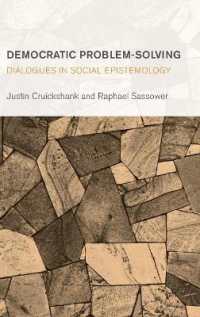- ホーム
- > 洋書
- > 英文書
- > Politics / International Relations
Full Description
This is an open access title available under the terms of a CC BY-NC-ND 4.0 International licence. It is free to read at Oxford Scholarship Online and offered as a free PDF download from OUP and selected open access locations.
How do non-governmental organizations (NGOs) create the spaces in which they act, despite all the odds that are stacked against them? How do NGOs meet the requirements of the moment, often being in the right place at the right time? Why is the sum of NGO activity frequently greater than the parts?
To answer these questions, A Relational Approach to NGOs in Global Politics analyses the ways in which NGOs relate to each other as well as with states, intergovernmental organizations, businesses, and other actors. It considers NGOs as living organizations - flexible, adaptive, creative - to examine the various NGO relationships and how they are built to surmount challenges, manage complexity, and make progress. In doing so, it sheds light on their power and agency in global politics.
Maryam Zarnegar Deloffre and Sigrid Quack develop core conceptual building blocks, such as NGOing and typologies of social interactions and relational power, which are explored in empirical studies of NGOs on a range of topics. These include legal environmental conflicts, humanitarian assistance, and counterterrorism, as well as analyses of relational forms such as super-networks, meta-associations, and mergers and acquisitions.
With a broad conceptualization of NGO-NGO relationships and in-depth analysis of the forms and processes of NGO interactions, this volume expands the understanding of NGOing, promotes synthetic knowledge about the power and effects of NGO interactions, and reveals new perspectives on processes of global governing.
Contents
Acknowledgements
List of Figures
List of Tables
Abbreviations
Notes on Contributors
1: Maryam Zarnegar Deloffre;Sigrid Quack: A Relational Approach to NGOs in Global Politics
Part I. Social Ties
2: Domenico Carolei: NGODSNGO Conflict: The Legal Case of Survival International v. WWF
3: Sotiris Petropoulos: The Power of Interpersonal Ties: INGO Relations in the Greek Refugee Crisis
4: Hans Peter Schmitz;George E. Mitchell;Bin Chen: NGO Mergers and Acquisitions: A Social Relational Perspective
Part II. Configurations
5: Nina Reiners: NGODSNGO Interactions through Individuals: Patterns and Effects for Social Rights Advocacy
6: Huimin Cheng;Ye Wang;Ping Ma;Amanda Murdie: Pathways to Brokerage: A Relational Approach to Understanding Global South Inter-Community NGO Networking
7: William E. DeMars;Dennis Dijkzeul: NGO Self-Organization and Orchestration in Ethiopia: Dynamics of Cooperation and Conflict
Part III. Sites of Interaction
8: Andrea Schapper: Super-Networks as Sites of TANDSTAN Interaction in International Climate Politics
9: Katherine R. Cheng;Emily Finchum-Mason;Mary Kay Gugerty: Coordinating Civil Society?: How NGO Associations Navigate Transnational Collaboration
10: Susan Appe;Ana Paula Borges Pinho: NGODSNGO Interactions, Brazil>'s Counterterrorism Legislation, and Beyond
Part IV. Conclusion
11: Maryam Zarnegar Deloffre;Sigrid Quack: Conclusion: Main Findings and Future Research Directions
12: Index







